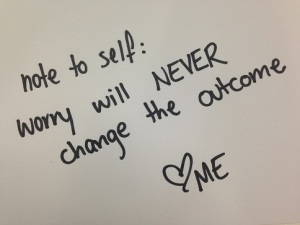 A client asked me the other day what is the difference between worry and anxiety? How do you know that you are anxious and not just a little worried? Here’s a quick guide to help.
A client asked me the other day what is the difference between worry and anxiety? How do you know that you are anxious and not just a little worried? Here’s a quick guide to help.
Worry
Worry is a natural response to a problem, a difficulty or a challenging situation. The worry can help us get through the situation or find a solution to the problem.
- People who worry tend to do so for less than 1 hour a day.
- Your worrying doesn’t interfere with your work or social life.
- Your concerns are controllable and can be dealt with fairly easily and in the short-term.
- Worry is usually about specific topics. Eg. A job interview coming up, how to pay that big credit card bill, wondering how you can help your child with school work.
- Worrying can cause you mild distress, but you can identify a specific cause of your worry and why and when you started to worry.
- Worry usually goes once the situation has passed or the problem has been sorted out.
Anxiety
Anxiety is when worry lasts for a long time and the feelings associated with it, such as fear and unease, feel too strong and uncomfortable.
- Anxiety develops when you worry about things for several hours, every day, and have been excessively worrying like this for months.
- Your worrying feels like it’s out of control and is getting in the way of relationships, work and your social life.
- Your worrying is all consuming – it’s there all the time and can be very distressing.
- You worry about a broad range of subjects and a lot of it involves ‘what if….’ thinking.
- Your worrying is accompanied by other symptoms – you are finding it hard to get to sleep or stay asleep, you feel tense and are irritable with those around you, you feel on edge and restless, you have difficulty concentrating and have a feeling of being on constant alert.
Tips to manage your anxiety
Anxiety is very common and can be successfully treated. Try these self-help steps first.
- Anxiety is caused by your thoughts and the internal dialogue running inside your head.
- This thinking usually involved ‘what if…’ thinking about the future, and trying to find a solution to a problem that hasn’t happened yet.
- Worrying like this is unproductive and saps your emotional and mental energy, without the prize of any solid problem solving.
- Worrying isn’t helping and once you recognise this, you are on the first step to reducing your anxiety.
2. Relaxation techniques
- Practice deep breathing – see here for a breathing exercise which helps your mind and body relax.
- Try meditation – here’s a guide to a quick and easy meditation.
3. Connect with others
- Talk about your anxiety and worries with those close to you – family and friends.
- Reach out and ask for help and support.
4. Change your lifestyle
Some simple changes can really help your anxiety reduce.
- Limit caffeine and sugar intake – both are stimulants. Sugar causes blood sugar to spike then crash which can magnify physical feelings of anxiety such as shaking and nervousness, and caffeine can interfere with your sleep.
- Exercise regularly
- Avoid alcohol – it’s a depressant and relying on it to reduce anxiety may lead to drinking too much or dependency.
- Get enough sleep. See here for some sleep tips, including how to settle a racing mind.
If the anxiety doesn’t subside despite taking some self-help measures, then professional help may be needed.
Your GP may be able to make a diagnosis and refer you to a counsellor, or you could seek help from a private counsellor.
Westend Counselling works with clients successfully using Cognitive Behavioural Therapy to treat anxiety. We work together to identify what’s causing the anxiety, look at the ‘what if..’ thinking, and devise strategies to move forward and cope with anxiety-provoking issues in the future.

